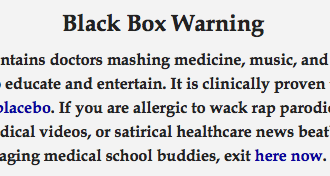Reading the BMJ today I was struck by a number of stories that appear to tell us that nothing is what we think it is in medical practice.
There were reports contravening current thinking in areas ranging from flu vaccines, breast cancer, health screening and more…partly this is obvious, as studies that simply confirm what we belive often don’t merit even a news in brief.
But partly, I thought, a lay reader (like myself) might think: “Gosh, haven’t we got it all wrong?!”
Well, yes. And, no.
Reading the BMJ today I was struck by a number of stories that appear to tell us that nothing is what we think it is in medical practice.
There were reports contravening current thinking in areas ranging from flu vaccines, breast cancer, health screening and more…partly this is obvious, as studies that simply confirm what we belive often don’t merit even a news in brief.
But partly, I thought, a lay reader (like myself) might think: “Gosh, haven’t we got it all wrong?!”
Well, yes. And, no.
The answer is buried in a research paper in the same issue (Ferreira et al BMJ 2012;345:e5913) that asks “When is a further clinical trial justified?”:
“The role of clinical trials is to provide unbiased estimates of the beneficial effects of health interventions so that it can be ascertained whether those effects outweigh risks, costs, and inconvenience”
That’s the key – changes to medical practice and understanding should be driven by the evidence. Not by what we want to believe, and what we cling to as “established wisdom”.
The litany of accepted health truths being slowly demolished by research may be cause for dejection and depression among casual observers, but I think this is something that we should celebrate. Yes, celebrate.
Source: gigipeterkin.com via Conor on Pinterest
Ferreira et al explain how to assess the need for further research around a given interevention, urging reason in thinking about how and when to challenge established medical practice.
That is, scientific method is alive and well: We should continually question, even accepted knowledge. If we hadn’t Columbus would not have gone to America, Einstein would not have developed the theory of relativity, and Frank Zappa would not have broken the boundaries between rock, jazz and classical music. Quite simply, the world would be a lesserr place.
We should not allow ourselves to rest on the dogma of previous research when good scientific method throws up challenges to what we previously believe. So I celebrate these articles that make us think and challenge what we may have accepted previously as good medical practice based on the fullness of the then currently available information.
For the record, the articles that sparked this rant are:
Belief not science is behind flu jab promotion: Telling us that an independent meta-analysis of vaccines against flu has found that claims of benefit have been significantly exaggerated. Pharma watch out for a Daily Mail backlash BMJ 2012;345:e7856
Mammography results in substantial overdiagnosis of breast cancer, concludes study: Adding grist to the mill of this long-debated question. BMJ 2012;345:e7910
The value of conducting periodic health checks:A study shows there is no evidence that general health checks are effective, and may increase overdiagnosis.Expensive executive health screen, anyone? BMJ 2012;345:e7775








